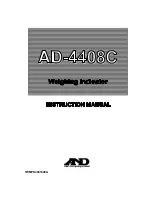
12
13
The instructions listed below should be carefully followed during testing to ensure best accuracy.
• Color or suspended matter in large amounts may cause
interference, therefore these should be removed by
treatment with active carbon and by prior filtration.
• For a correct filling of the cuvette: the liquid in the
cuvette forms a concavity on the top; the bottom of this
concavity must be at the same level of the 10 mL mark.
• Proper use of the powder reagent packet:
(a) use scissors to open the powder packet;
(b) push the edges of the packet to form a spout;
(c) pour out the content of the packet.
GENERAL TIPS FOR AN ACCURATE MEASUREMENT
Battery low:
The battery must be replaced soon.
Dead battery:
This indicates that the battery is dead and must
be replaced. Once this indication is displayed, normal operation
of the instrument will be interrupted. Change the battery and
restart the meter.
Under range:
A blinking
“0.00”
indicates that the sample
absorbs less light than the zero reference. Check the procedure
and make sure you use the same cuvette for reference (zero) and
measurement.
Over Range:
A flashing value of the maximum concentration
indicates an over range condition. The concentration of the
sample is beyond the programmed range: dilute the sample and
re-run the test.
c) during calibration procedure
Standard Low:
The standard reading is less than expected.
Standard High:
The standard reading is higher than expected.
Cap error:
Appears when external light enters in the analysis
cell. Assure that the cuvette cap is present.
Cooling lamp:
The instrument waits for the lamp to cool down.
d) other errors and warnings
Distributed by Applied Membranes, Inc.
http://www.appliedmembranes.com
Distributed by Applied Membranes, Inc.
http://www.appliedmembranes.com

































